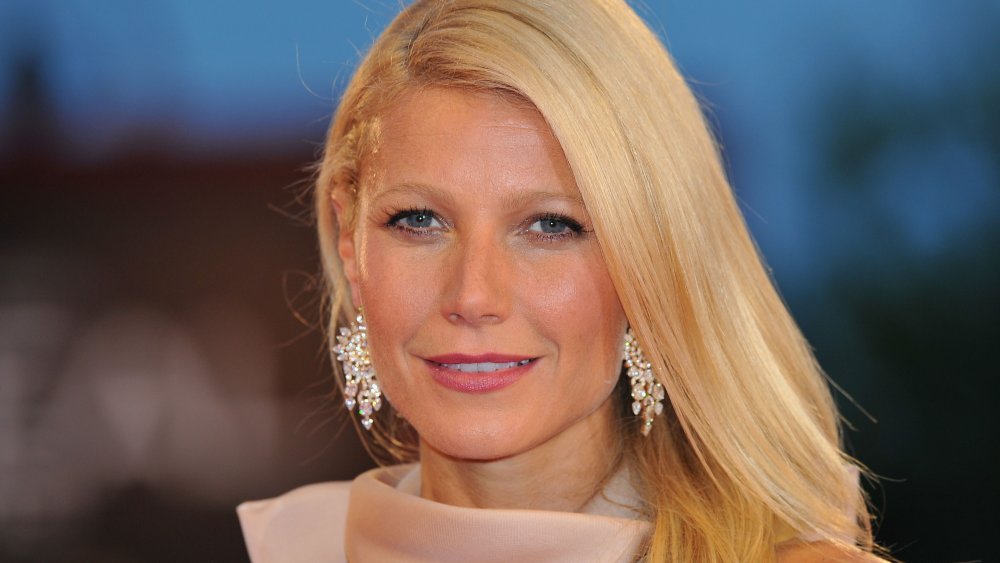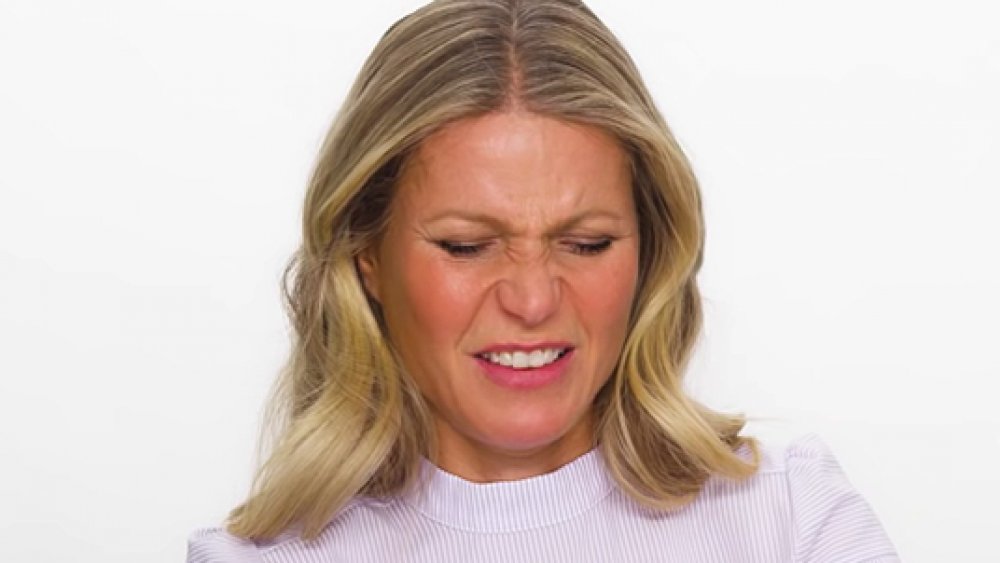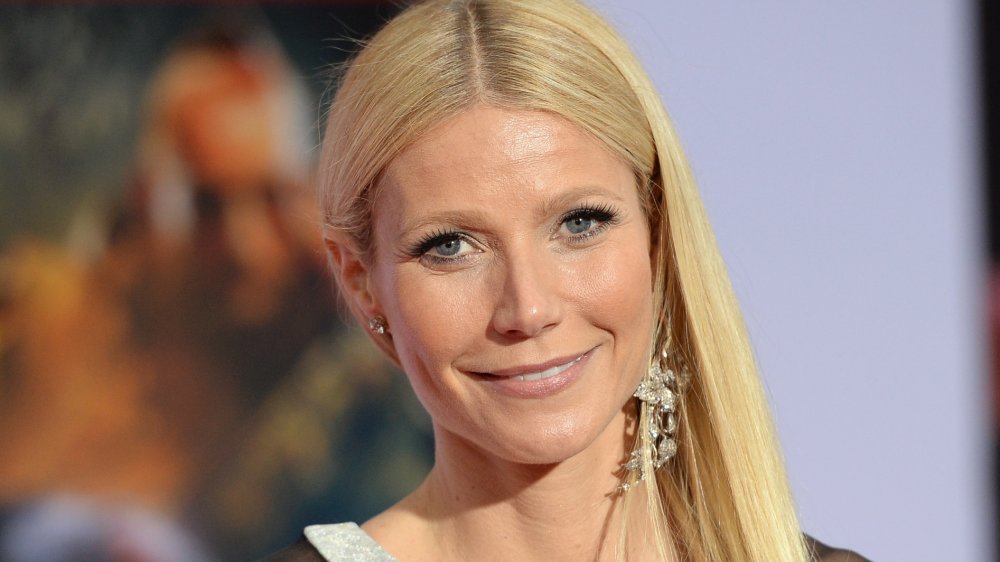The Shady Side Of Gwyneth Paltrow's Goop
Gwyneth Paltrow paints the rise of her wellness and lifestyle brand, Goop, as a company with humble beginnings. "Launched in 2008 out of Gwyneth Paltrow's kitchen as a homespun weekly newsletter, GP created goop to organize her unbiased travel recommendations, health-centric recipes, and shopping discoveries for friends, and also as a place to get her own questions — about health, fitness, and the psyche — answered," Goop's website states. That's a low-key way to describe an idea that has transformed into a venture reportedly worth $250 million. This homespun experiment now includes a line of wellness and beauty products, a podcast, a popular website, and a magazine. Did Paltrow launch her little newsletter with all this in mind? Was she trying to kick Martha Stewart off her throne? Some critics have suggested the Oscar-winner hasn't always been honest in her quest, even claiming that Paltrow lied about her products to gain fans.
Of course, it wouldn't be fair to accuse Paltrow of being the only celebrity-turned-health guru who's experienced some missteps along the way, but the controversy surrounding this mom-of-two is more than an Instagram model fibbing about the benefits of supposed weight-loss tea. Paltrow's drama with Goop includes lawsuits and even allegations that she's a full-blown "extortionist." These claims resurfaced when Netflix partnered with Goop for a new TV series, The Goop Lab, scheduled to debut Jan. 24, 2020.
So light your Gwyneth Paltrow vagina-scented candle (yeah, that's a thing) and let's dig into this shady mess.
Gwyneth Paltrow's jade egg debacle
There's plenty of questionable stuff to cover when it comes to Goop, so let's start with the elephant — or shall we say, the egg — in the room. This particular controversy started in 2017, when marketing watchdog Truth In Advertising (TINA) sent Paltrow and Goop a letter accusing the company of using "deceptive health and disease-treatment claims" to sell products. Goop supposedly didn't address those concerns, so TINA contacted the California Food, Drug, and Medical Device Task Force. The result? Goop was slapped with a lawsuit centering around three products: the Jade Egg, the Rose Quartz Egg, and the Inner Judge Flower Essence Blend.
Goop claimed the eggs — which are meant to be inserted into the vagina — can increase "chi, orgasms; vaginal muscle tone, hormonal balance, and feminine energy in general," according to Vox. But numerous OB/GYNs and health experts denied those "benefits." Dr. Jen Gunter railed about it on her blog, calling the products "the biggest load of garbage I have read on your site since vaginal steaming. It's even worse than claiming bras cause cancer. But hey, you aren't one to let facts get in the way of profiting from snake oil."
BTW: Goop seemingly implied that underwire in bras is linked to breast cancer (It's not true.) Goop also recommended a spa promoting vaginal steaming, but that practice was slammed as "startlingly unnecessary."
In the end, Goop settled the aforementioned lawsuit for $145,000, calling the whole thing an "honest disagreement."
Sorry, Goop, NASA isn't impressed
We don't want to make it seem like we're coming down hard on Goop, but when a company manages to piss off NASA, it's worth investigating. Here's what happened: In June 2017, Goop advertised $120 stickers designed to supposedly "rebalance energy frequency" in customers' bodies. Created by Body Vibes, Goop reportedly claimed the stickers were made out of the "same conductive carbon material NASA uses to line space suits so they can monitor an astronaut's vitals during wear," reasoning this material could "target imbalances" in the body, as stated in a since-deleted post (via Vox).
The promotion caught the eye of Mark Shelhamer, former chief scientist at NASA's human research division, who told Gizmodo that Goop's stickers are a "load of BS" because space suits aren't made with carbon, and if they were, it wouldn't be to monitor vital signs. "Not only is the whole premise like snake oil, the logic doesn't even hold up," Shelhamer said. "If they promote healing, why do they leave marks on the skin when they are removed?"
Body Vibes later backtracked via a statement to Gizmodo: "We apologize to NASA, Goop, our customers and our fans for this communication error ... We have learned that our engineer was misinformed by a distributor about the material in question, which was purchased for its unique specifications. We regret not doing our due diligence..."
Despite the controversy, Goop still promotes the stickers on its website. Hmm.
Goop was slammed for endorsing 'leanest livable weight'
Thanks to the body positivity movement, many people are celebrating all types of figures and sizes in the spirit of self-love. So when Goop published an interview with Traci Mann, a professor at the University of Minnesota, about achieving your "leanest livable weight," you bet readers took notice. But first, here's a little info about this term, as explained by Mann: "Your 'leanest livable weight' is the weight at the low end of your 'set range.' Your set range is a genetically determined range of weight that your body generally keeps you in, despite your efforts to escape it."
Twitter erupted after the article published, with one user redefining the headline as such: "Aka, how to be as thin as possible without dying." Another critic tweeted, "As a health and fitness professional I would never use those words. Healthy is not classed as 'leanest livable weight.'"
Although we see how it's a bit iffy of Goop to promote a phrase that could be triggering or easily misinterpreted, it's important to note that Mann seemingly wasn't trying to encourage Goop readers to practice unhealthy habits. "For many of us, our leanest livable weight is heavier than our dream weight," Mann said. "I urge people to aim for their leanest livable weight, rather than below it. Embrace it — it's where your body wants you to be, it's easy to maintain, and you can be healthy there."
Is Gwyneth Paltrow extorting Goop fans?
After Goop ballooned into a major lifestyle brand, it started offering "wellness summits" promising "talks and panels" with Gwyneth Paltrow and "intimate workshops, all-day food and drinks, and self-care galore," according to its website. Sounds fun, right? Not according to one customer who attended a London-based wellness summit in June 2019 to the tune of $5,700.
"Gwyneth acts like she's a health goddess, but actually she's a pretentious, greedy extortionist," the irritated fan railed to Page Six. "She had a ton of security ... She was unapproachable. She did the minimum — a few fireside chats with Twiggy and Penelope Cruz, then she put on her Birkenstocks and snuck out ... I was a huge fan of Gwyneth; now I feel like I have lost my faith in God." Additionally, some attendees discovered they had paid "$1,300 for two nights at the Kimpton Fitzroy London Hotel" despite the weekend rates starting at $250 a night.
The reference to God is a bit, um, intense, but $6,000 is arguably too much to walk away disappointed. That being said, a Goop rep denied the nasty claims, telling Page Six, "The overwhelming response to our London Summit was incredibly positive." As for those pricey hotel rooms? The Goop rooms were reportedly suites with a "gluten-free breakfast included."
Gwyneth Paltrow's Goop may take its cues from Mean Girls
Remember the iconic scene in Mean Girls when Lacey Chabert's character, Gretchen Wieners, tells queen bee Regina George (Rachel McAdams) that she can no longer sit at their exclusive lunch table? Chabert shrieking, "You can't sit with us!" is a great metaphor for Goop because it supposedly tries to exclude certain customers from its ultra-high-end market. Take Goop's very own night cream, which retails for $140, or what about its $595 G. Label cardigan? That sweater better be spun from gold for that price.
To be fair, however, Gwyneth Paltrow has the right to market to any audience she pleases. "It's crucial to me that we remain aspirational. Not in price point, because content is always free," the wellness aficionado said, according to a feature in The New York Times Magazine. She added, "Our stuff is beautiful. The ingredients are beautiful. You can't get that at a lower price point. You can't make these things mass-market."
Translation: Gwyneth Paltrow is going to keep on Gooping until the cows — or crystals — come home, controversies or not.






